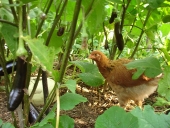Hi Luigi,
Yes, it's possible to transition to something better, but no, Big Ag won't do it and the individual farmers here in the US are afraid to make the switch. Let me explain.
For the record, I do not farm on a large scale, but I have lived virtually all my life in a large farming community and still associate everyday with farmers. Around here farms are measured in thousands of acres. Farmers have been indoctrinated into a system that they don't see a way out of. Much like in the video, Big Ag's emphasis is on genetically modifying, increasing and developing new pesticides, and to rely on petroleum to gain yield. No revolutionary ideas are allowed because most of them don't profit Big Ag. They have all the money, and the farmers I know are afraid if they vary from the plan by even the smallest amount, they will suffer a large financial set-back. I have even spoken to some of them about trying a poly-culture silvo-pasture experiment, but they are so heavily indoctrinated that they won't even try it, even as they complain that they aren't making any money at what they are doing.
You have to remember, until recently, cover-crops weren't even a consideration. They would just dump more anhydrous ammonia on it. But even that doesn't work when the soil dies. Now you see a few farmers trying to revitalize fields with turnip plantings, but all of this is going at such a slow pace, it will be years before they will finally make the change, and by that time, it will probably be to late.
You can lead a horse to water, but you can't make him drink! As has been said in the previous posts, these farmers are visited all the time by large corporate conglomerates that push the newest herbicide, etc. It's a cult and you don't leave the cult. There are a few of them that instinctively know that something isn't right, but until they see the farmer next door doing it and being successful, not much will change.
Our mono-culture, petroleum food system is very fragile and it frankly scares me to death to think about it sometimes.





